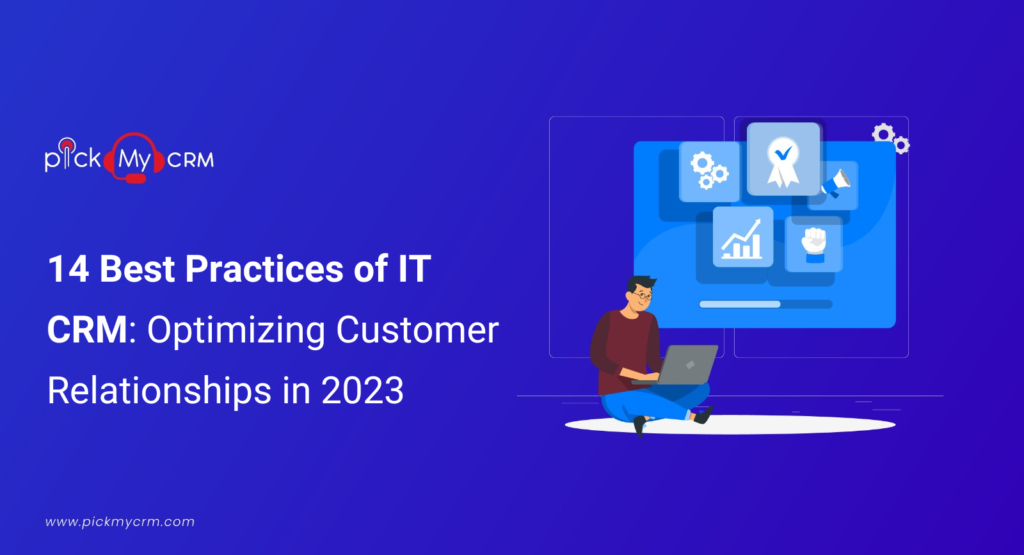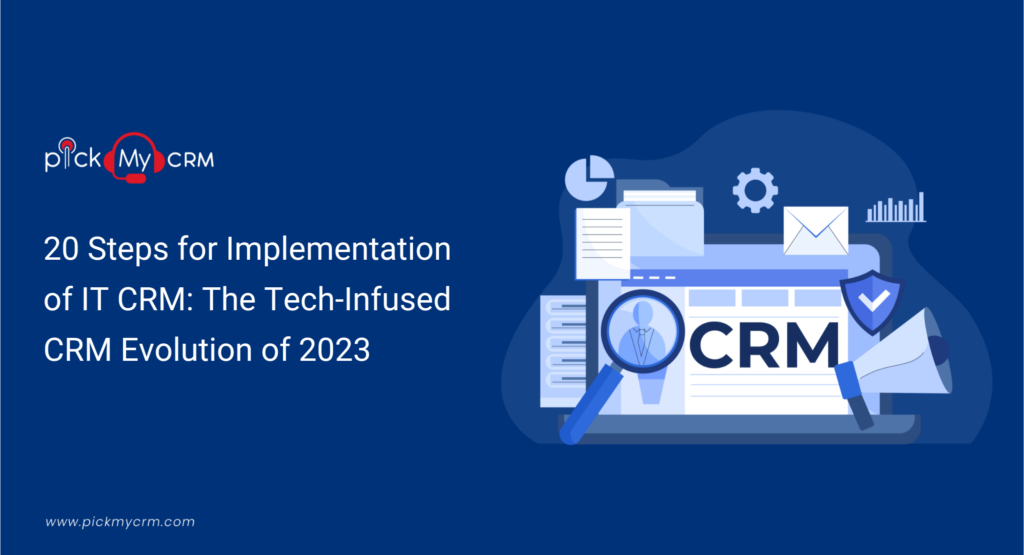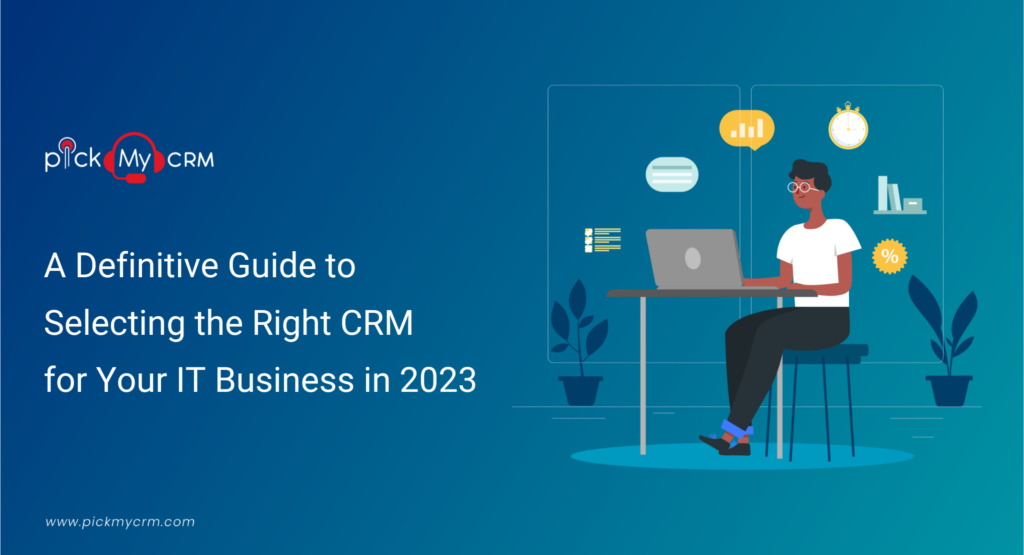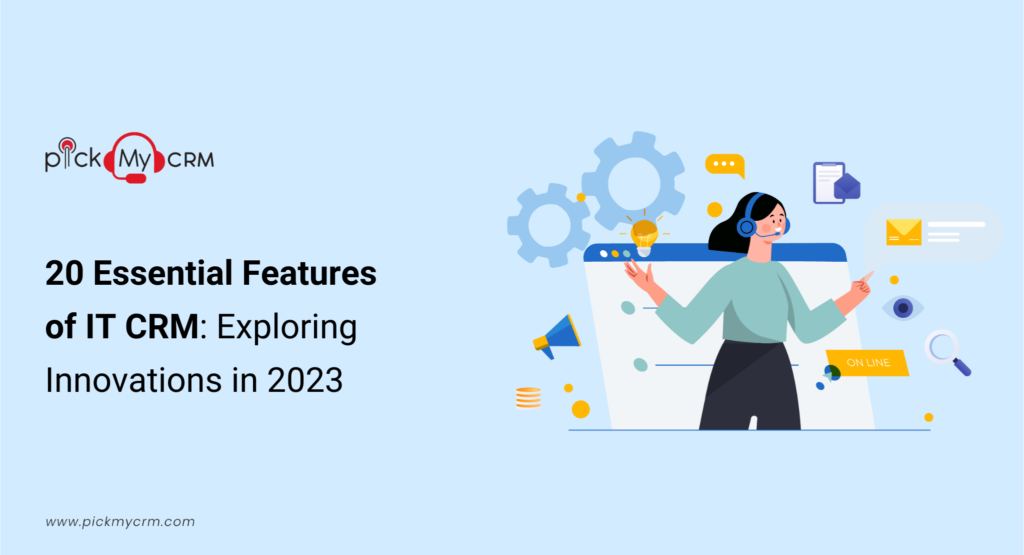14 Best Practices of IT CRM: Optimizing Customer Relationships in 2023
Why Best Practices of IT CRM Matter in 2023
In 2023, Implementing Best Practices of IT CRM cannot be emphasized enough. With 64% of customers expecting tailored engagements based on past interactions, businesses that embrace effective CRM strategies are poised to retain customers and foster brand advocacy. In an era where personalized experiences and seamless interactions are paramount, a robust IT CRM approach empowers companies to meet these expectations, leading to improved customer retention rates, increased revenue, and a competitive edge in the market.14 Best Practices of IT CRM
In the IT sector, Customer Relationship Management (CRM) has transitioned from a simple database tool to a strategic methodology that enables businesses to grasp, engage, and retain customers in the digital era. Implementing the best practices of IT CRM is essential for optimizing customer interactions and fostering lasting relationships. Let's delve into the elements of these practices,Choose the Right CRM Solution
Choosing the right CRM solution lays the groundwork for effective execution. Evaluate scalability, integration, customization, and user-friendliness when making your decision. A well-aligned CRM system ensures it can evolve with your business needs while catering to unique customer demands.Clean and Integrated Data Management
Precise and current customer data forms the foundation of successful CRM. Regularly cleanse and update customer information to avoid duplicates and inaccuracies. Integrate your CRM system with other relevant tools and databases across departments to ensure a comprehensive view of each customer's interactions.Personalization at Scale
Leverage customer data to create personalized experiences at scale. Implement automation and AI-driven insights to tailor interactions, product recommendations, and communications based on individual preferences and historical behavior. Personalization enhances engagement and customer satisfaction.Multichannel Communication
Engage customers through their chosen communication channels: email, social media, chatbots, or mobile apps. A seamless multichannel approach ensures consistent and effective interactions, enhancing customer engagement and responsiveness.Workflow Automation
Streamline workflows by automating repetitive tasks. It enhances efficiency while preventing oversight of vital customer interactions, resulting in quicker responses and superior customer experiences.Analytics and Reporting
Utilize CRM analytics for insights into customer behavior, preferences, and trends. Track essential KPIs such as customer acquisition costs, lifetime value, and conversion rates. These insights guide informed decision-making and provide the basis for continuous improvement.Customer Support Excellence
Empower your customer support teams with easy access to customer information and interaction history. It helps resolve issues faster and enhances customer satisfaction. Implement self-service options, knowledge bases, and AI-powered chatbots for efficient support.Strategies for IT CRM Success in 2023
Now that we've grasped the Fundamentals. Let's explore actionable strategies to excel in IT CRM this year,Customer Segmentation
Not all customers are identical, and Treating them as such can result in overlooked opportunities. Implement robust segmentation based on demographics, behaviors, and purchase history. It enables you to craft targeted marketing campaigns and communications.Automation and Chatbots
Automate routine tasks and inquiries through chatbots. It not only saves time but also guarantees quick and uniform responses, thereby enhancing customer satisfaction. AI-driven chatbots can handle a wide range of customer interactions efficiently.Predictive Analytics
Predictive analytics uses historical data and AI to forecast customer behavior. By Identifying potential issues or opportunities in advance, you can proactively address concerns and offer relevant solutions. Mobile-Centric Approach In 2023, mobile devices will be central to customer engagement. Ensure that your CRM strategy is mobile-responsive and provides a seamless mobile experience. Mobile apps, push notifications, and mobile-friendly websites are critical components.Security and Data Privacy
With increasing concerns about data security and privacy, prioritize safeguarding customer data. Implement robust cybersecurity measures and ensure compliance with data protection regulations like GDPR and CCPA.Continuous Training and Adoption
Provide training to employees on CRM usage and its benefits. Encourage adoption through ongoing support and regular updates. A workforce knowledgeable about the CRM's capabilities can optimize its potential, leading to enhanced customer experiences and outcomes.Data Security and Compliance
Ensure customer data is stored securely and comply with data protection regulations such as GDPR or CCPA. Upholding customer trust is paramount, and ensuring adherence to data security practices and legal requirements is indispensable.Regular Evaluation and Improvement
Periodically assess the effectiveness of your CRM practices. Monitor customer feedback, analyze data, and identify areas for enhancement. Continuously iterate your CRM strategy to adapt to changing customer expectations and industry trends.Measuring and Improving CRM Performance
To stay ahead in 2023, you must continuously measure and optimize your CRM efforts. Here's how: Key Performance Indicators (KPIs) Define clear KPIs that align with your CRM objectives. These may include customer satisfaction scores, customer retention rates, conversion rates, and customer lifetime value. Regularly monitor these KPIs to gauge the effectiveness of your CRM strategy. Feedback Loops Establish feedback mechanisms to gather insights directly from customers. Use surveys, feedback forms, and social listening tools to understand their experiences and expectations. Act upon this feedback to make data-driven improvements. A/B Testing Conduct experiments with various CRM strategies and tactics through A/B testing. It enables you to pinpoint the most effective approaches for your audience and make well-informed, data-backed decisions.Data-Driven Customer Insights
To optimize customer relationships, you must first understand your customers deeply. Collect, analyze, and utilize data to create customer profiles and gain insights into their preferences, behaviors, and pain points. This data-driven approach empowers you to tailor your interactions and offerings for maximum impact.Seamless Omnichannel Experience
Customers anticipate a seamless experience across all touchpoints, whether it involves your website, mobile app, social media, or in-person interactions. Investing in an omnichannel CRM system ensures that every customer touchpoint is consistent and personalized, enhancing customer satisfaction and loyalty.AI-Powered Personalization
Harness the potential of Artificial Intelligence (AI) to provide personalized experiences on a grand scale. AI algorithms can analyze data in real time, enabling you to recommend products, content, or solutions tailored to each customer's unique needs and preferences.Recent Statistics and Trends in IT CRM
Before we dive into the nitty-gritty of CRM best practices, let's take a moment to examine some recent statistics and trends shaping the industry, The Rise of Chatbots and AI- In 2022, 85% of customer interactions were managed without human intervention, thanks to AI-powered chatbots.
- By 2023, it's projected that the use of AI in CRM will increase by 139%, boosting productivity and enhancing customer experiences.
- As of 2022, 89% of consumers expressed concerns about the security of their data, underscoring the need for robust data protection measures.
- As a response, CRM systems are placing their emphasis on transparency and adhering to data privacy regulations.
- The adoption of Mobile CRM has been steadily increasing, with mobile-centric strategies becoming standard practice.
- In 2022, mobile CRM users surpassed 1.3 billion worldwide, emphasizing the importance of mobile optimization in CRM.
- Businesses that employ personalized marketing strategies in their CRM efforts saw an average increase of 20% in sales.
- In 2023, personalization continues to be a driving force in customer retention and engagement.
Leveraging AI and Chatbots for Enhanced Customer Engagement
AI-Powered Chatbots: Your 24/7 Customer Support
In the fast-paced world of IT, customer expectations are higher than ever. They want quick and accurate answers to their queries, and they want them now. It is where AI-powered chatbots step into the spotlight. These virtual assistants can handle routine inquiries, provide instant support, and recommend products or services based on customer preferences. By 2023, they've become indispensable tools for enhancing customer engagement.Overcoming the Data Privacy Challenge
Data serves as the lifeblood of CRM, and its collection and utilization require the utmost responsibility. Recent data privacy concerns have led to the implementation of stricter regulations, such as the California Consumer Privacy Act (CCPA) and the General Data Protection Regulation (GDPR). Adhering to these regulations isn't solely a matter of compliance; it's about cultivating trust with your customers. When they have confidence in the Secure handling of their data, they become more inclined to engage with your brand.The Mobile-Centric Approach: A Game Changer
The Mobile App Advantage
In the era of smartphones, having a mobile app is no longer an option; it's a necessity. Mobile CRM apps provide customers with Convenient access to your products and services, fostering loyalty and repeat business. Recent studies show that Businesses with well-designed mobile apps experienced a 37% increase in customer retention rates.Push Notifications: A Double-Edged Sword
While push notifications can be a powerful tool for engaging customers, they can also be a Source of Frustration if overused. Striking the right balance is essential. Recent research indicates that customers are more likely to opt out of push notifications if they receive too many or irrelevant messages. Thus, careful segmentation and timing are crucial in maximizing their effectiveness.The Importance of Training and Adaptation
Staying Ahead of the Curve
In the dynamic world of IT CRM, staying ahead of the curve requires continuous learning and adaptation. Recent surveys suggest that companies that invest in ongoing training for their CRM teams are 25% more likely to exceed their sales goals. By keeping your team up-to-date with the latest CRM technologies and strategies, you ensure the full leveraging of CRM tools to your advantage.A Unique Perspective: The Challenges of CRM Implementation
In our Exploration of IT CRM best practices, it's essential to acknowledge that CRM implementation is not without its challenges. While we've discussed the numerous benefits, It's also important to consider the potential pitfalls,CRM Integration Hurdles
One of the primary challenges in CRM implementation is the integration of CRM systems with existing technologies. Many businesses struggle with ensuring that their CRM seamlessly connects with their sales, marketing, and customer support tools. Failure in this aspect can result in fragmented customer data and inefficient processes.Resistance to Change
Implementing a new CRM system requires a cultural shift within the organization. Employees may resist changes to established workflows, viewing CRM as an additional burden rather than a valuable tool. Implementing effective change management strategies is imperative for surmounting this challenge.Measuring Success and Ensuring Long-Term Growth
As you embark on your journey to excel in IT CRM in 2023, measuring your success and ensuring long-term growth is paramount. Here's how to go about it, Customer Lifetime Value (CLV) To gauge the effectiveness of your CRM strategy, calculate the CLV. This metric reveals the total revenue a customer is Expected to Generate over their lifetime as your customer. By increasing CLV, you maximize the return on your CRM investment. NPS (Net Promoter Score) The NPS is a reliable indicator of customer satisfaction and loyalty. Regularly measuring NPS helps you identify areas for improvement and monitor the impact of changes in your CRM strategy. Churn Rate The churn rate measures the percentage of customers who stop using your products or services within a specified period. A high churn rate indicates possible concerns within your CRM strategy that require attention. Customer Feedback and Surveys Continuously gather customer feedback through surveys and feedback forms. This direct input provides valuable insights into customer experiences and preferences.Benefits of IT CRM Best Practices
Implementing the best practices of IT CRM offers a multitude of benefits for businesses,- Enhanced Customer Relationships: Personalized interactions foster lasting connections and loyalty.
- Improved Satisfaction: Tailored experiences lead to higher customer contentment.
- Increased Retention: Effective CRM reduces churn, boosting customer loyalty.
- Streamlined Processes: Efficient management of leads, sales, and support.
- Targeted Marketing: Accurate data enables precise and effective campaigns.
- Data-Driven Insights: Informed decisions and strategy refinement.
- Cross-Departmental Collaboration: Improved teamwork and communication.
- Competitive Edge: Personalization attracts and retains customers.
- Scalability and Growth: Strong foundation for expansion.
- Revenue Growth: Increased sales and ROI from CRM investment.
- Adaptation to Trends: Flexibility to meet evolving customer demands.
When to do Best Practices of IT CRM?
The ideal time to implement the best practices of IT CRM is now. Whether you're a startup looking to establish strong customer relationships from the outset or an established enterprise aiming to enhance customer management strategies, the dynamic digital landscape demands proactive adoption. By implementing these practices early, you can build a solid foundation for personalized customer interactions, streamline processes, and stay ahead of the curve in an increasingly competitive market.Where do Best Practices of IT CRM Apply?
The applicability of IT CRM best practices extends across diverse industries and business models. Whether operating in e-commerce, software development, IT services, or tech startups, any business that Interacts with customers can reap the benefits of a robust CRM system. Irrespective of industry, business size, or type, integrating IT CRM practices can elevate customer relationships, streamline operations, and fuel growth by providing personalized experiences and data-driven insights.Wrapping Up
In the realm of modern business, where customer-centricity reigns supreme, adopting the best practices of IT CRM emerges as a strategic imperative. In the dynamic realm of digital interactions, these practices pave the path for personalized customer experiences, efficient operations, and enduring growth. By harnessing the power of data, fostering loyalty, driving efficient communication, and exploring software options, organizations can not only meet the demands of the present but also position themselves at the forefront of innovation and customer satisfaction, securing a prosperous future in the dynamic world of commerce.




